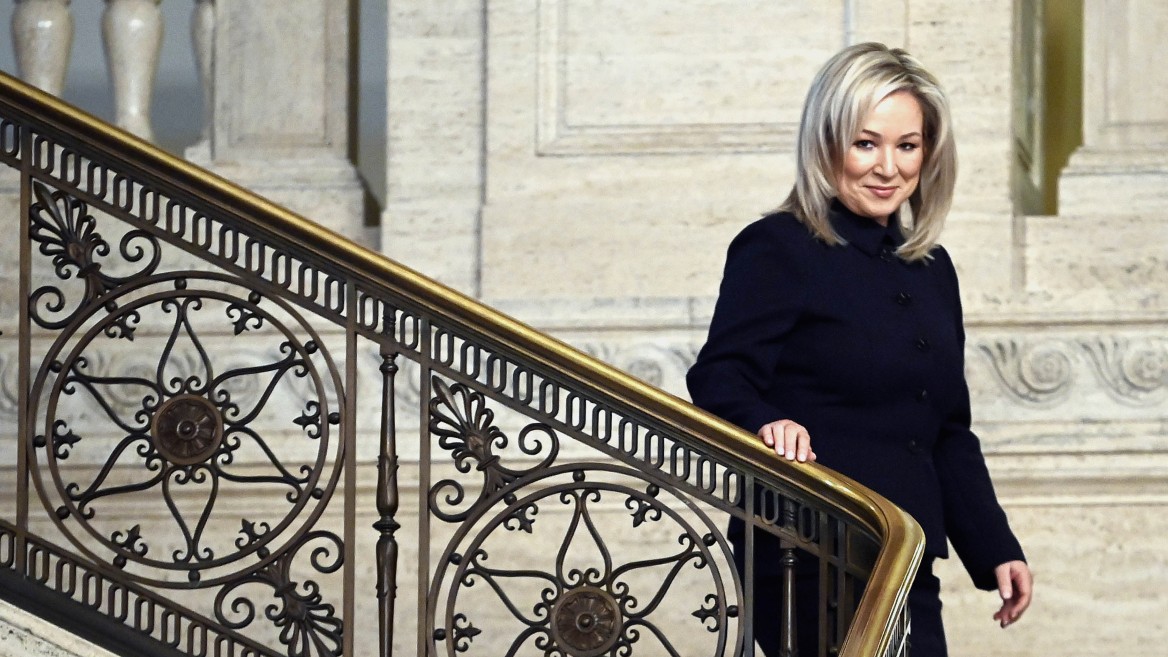Will Ireland unite?
'Vast obstacles' to unification referendum remain despite 'historic' appointment of nationalist first minister at Stormont

A free daily email with the biggest news stories of the day – and the best features from TheWeek.com
You are now subscribed
Your newsletter sign-up was successful
Sinn Féin leader Mary Lou McDonald declared that Irish unification "is within touching distance" as Northern Ireland's first ever nationalist first minister was sworn in.
Michelle O'Neill, McDonald's vice-president within the party, took office as head of the Northern Ireland Assembly on Saturday and has ignited speculation that a vote on uniting north and south could happen within 10 years. "I believe we're in the decade of opportunity," O'Neill told Sky News. "A nationalist republican was never supposed to be first minister. This all speaks to that change."
Restoring the power-sharing assembly with what feels like a workable settlement is a "stunning achievement" for the UK government, said Politico's London Playbook. But immediate talk of a border poll within a decade "shows it won't all be smooth sailing".
The Week
Escape your echo chamber. Get the facts behind the news, plus analysis from multiple perspectives.

Sign up for The Week's Free Newsletters
From our morning news briefing to a weekly Good News Newsletter, get the best of The Week delivered directly to your inbox.
From our morning news briefing to a weekly Good News Newsletter, get the best of The Week delivered directly to your inbox.
What did the commentators say?
The confirmation of O'Neill as first minister is undoubtedly "historic", said Adam Boulton on Sky News, but talk of a united Ireland may be premature.
"Safeguarding the Union", the 76-page agreement between the UK government and the Democratic Unionist Party (DUP) that paved the way to a restoration at Stormont, is "shot through with language affirming Northern Ireland's constitutional status as part of the UK", Boulton said. It reaffirms the UK government's long-held position that there is "no realistic prospect of a border poll" – a view supported by Northern Ireland Secretary Chris Heaton-Harris, who under the Good Friday Agreement must call a referendum if it "appears likely" a majority would back reunification. He said last week that he did not expect to see a united Ireland in his lifetime.
There has "always been a suspicion among unionists, which extends to some quarters in Dublin, that Sinn Féin has never really wanted Northern Ireland to work", argued Pat Leahy in The Irish Times. But while there is "no doubt that O'Neill's ascent is a landmark moment in Northern Ireland", The Guardian said, "the 10-year horizon she acknowledged also speaks to the fact that there are still vast obstacles to a referendum on the region's future".
Her appointment has "inevitably brought to the fore conversations about the prospect" of reunification, agreed The New York Times (NYT). But although an "ascendant' Sinn Féin could "provide further momentum to that cause", the party's "rise was more a reflection of the fractures that appeared among unionist parties after Britain left the European Union, rather than a widespread surge in Irish nationalism".
A free daily email with the biggest news stories of the day – and the best features from TheWeek.com
What next?
In some ways, said the NYT, the growth of nationalist political representation is "unsurprising". Demographics have shifted significantly in Northern Ireland over the decades, driven by a higher birth rate among Catholics, who in 2022 outnumbered Protestants north of the border for the first time, according to the latest census figures.
A LucidTalk/Sunday Times survey last October showed that 57% of people aged 18 to 24 in Northern Ireland would vote "yes" to reunification. Surveys have "consistently demonstrated that the Good Friday generation are more likely to vote for a united Ireland" and "more likely to identify as Irish or Northern Irish", said Emma DeSouza in The Guardian, and "that the vast majority do not align themselves with unionist ideology – all of which suggests pro-union parties are likely to face an uphill battle in convincing them that Northern Ireland's place is in the UK".
But this does not play out across all age groups, with current polling suggesting a majority of the population does not support unification. An Ipsos/Irish Times poll in December found more than half of all Northern Irish voters (51%) would vote against unity, with 30% in favour. "There is much stronger support for unity in the Republic", however, said the Belfast Telegraph, with 64% of respondents there saying they would vote for unity, compared to just 16% against.
Much will likely depend on the outcome of Ireland's general election, which is due to be held in the next 12 months. Sinn Féin has long topped the opinion polls, ahead of its current coalition partners Fine Gael and Fianna Fáil, making McDonald favourite to be the next taoiseach.
Were this to happen, said Boulton, "Ireland would be united at least in having female Irish republican political leaders in both the north and south", even if the chance of actual unification remains some way off.